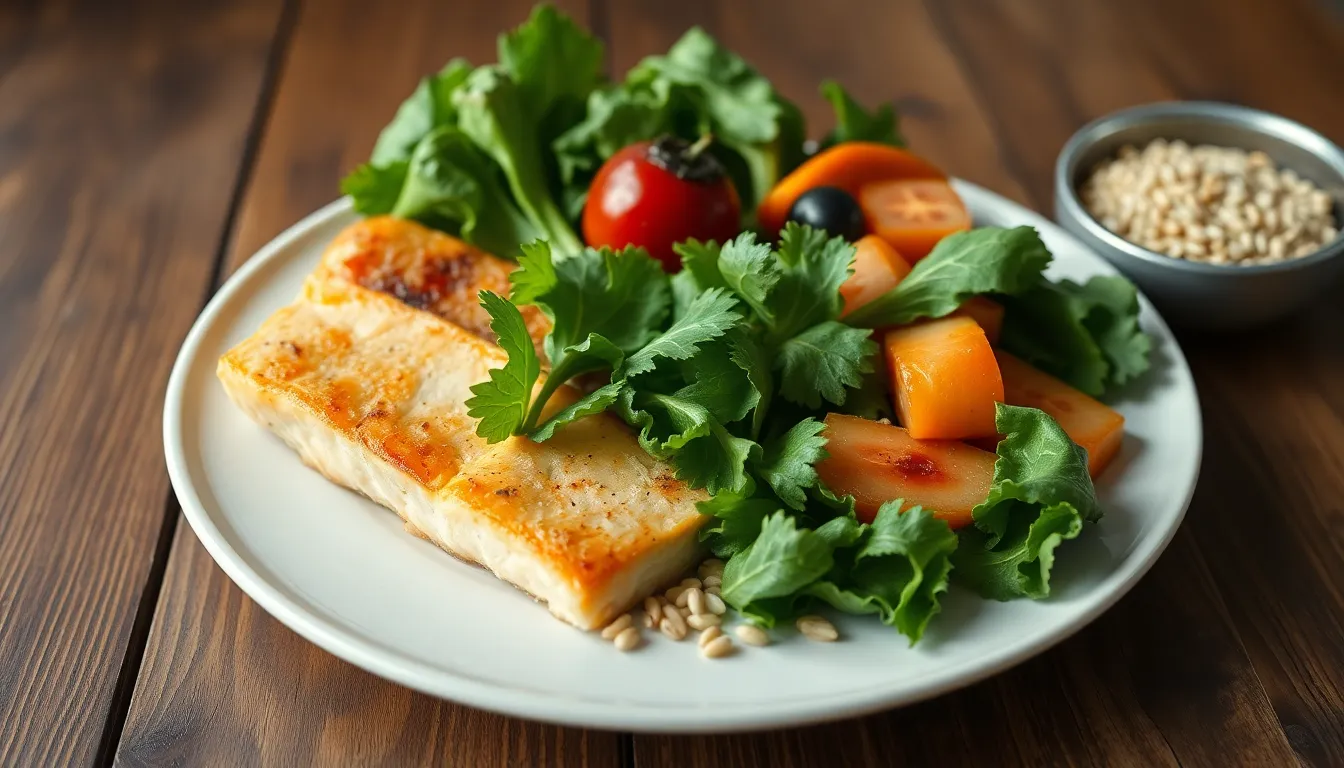Gastritis can be a frustrating and painful condition, affecting countless individuals worldwide. Characterized by inflammation of the stomach lining, it often leads to discomfort, bloating, and digestive issues. Many people seek lasting solutions to alleviate their symptoms and improve their quality of life.
Understanding how to cure gastritis for good involves a blend of lifestyle changes, dietary adjustments, and natural remedies. By taking proactive steps, individuals can reclaim their health and enjoy a gastritis-free life. This article explores effective strategies and insights that can help transform the way one approaches this common ailment, paving the way for lasting relief and wellness.
Table of Contents
ToggleUnderstanding Gastritis
Gastritis involves inflammation of the stomach lining, leading to discomfort and digestive complications. Understanding its nature and variations can guide individuals towards effective treatment strategies.
What Is Gastritis?
Gastritis refers to the swelling or irritation of the stomach lining. Symptoms often include abdominal pain, nausea, vomiting, and bloating. It can occur suddenly (acute gastritis) or develop gradually over time (chronic gastritis). Early diagnosis and appropriate treatment enhance recovery and reduce complications.
Types of Gastritis
- Acute Gastritis: This type appears suddenly and is often caused by excessive alcohol consumption, certain medications (like NSAIDs), or bacterial infections (like H. pylori). Symptoms may range from mild discomfort to severe abdominal pain.
- Chronic Gastritis: Chronic gastritis develops slowly over time, often linked to prolonged irritation from substances such as alcohol, smoking, or bile reflux. Individuals may experience recurring stomach pain and discomfort, sometimes without obvious symptoms.
- Atrophic Gastritis: Atrophic gastritis involves the thinning of the stomach lining and can be a precursor to stomach cancer. It’s commonly associated with autoimmune conditions and persistent H. pylori infections.
- Erosive Gastritis: Erosive gastritis results from the degradation of the stomach lining due to irritants. This form is typically more severe and can lead to bleeding or ulcers.
Understanding these types of gastritis can help individuals identify symptoms early and adopt appropriate lifestyle changes and treatment strategies.
Causes of Gastritis

Gastritis arises from various factors that irritate the stomach lining. Identifying these causes is crucial for effective management and prevention of symptoms.
Common Triggers
- Helicobacter pylori infection: This bacteria leads to inflammation and damages the stomach lining.
- Nonsteroidal anti-inflammatory drugs (NSAIDs): Prolonged use of medications like ibuprofen or aspirin can irritate the stomach lining.
- Excessive alcohol consumption: Drinking large amounts of alcohol contributes to inflammation and erosion of the stomach’s protective lining.
- Bacterial and viral infections: Other pathogens can cause inflammation, leading to gastritis symptoms.
- Autoimmune disorders: Conditions in which the body’s immune system attacks healthy cells in the stomach lining can result in gastritis.
Lifestyle Factors
- Dietary choices: Diets high in spicy foods, acidic foods, or those containing irritants, like caffeine and carbonated beverages, can aggravate gastritis.
- Smoking: Tobacco use increases stomach acid and decreases the stomach lining’s ability to protect itself.
- Stress: High stress levels can lead to increased acid production and worsen inflammation.
- Poor eating habits: Skipping meals, overeating, or eating irregularly disrupts normal digestion and contributes to gastritis.
- Obesity: Excess weight places additional pressure on the stomach, increasing the likelihood of gastritis symptoms.
Symptoms of Gastritis
Gastritis symptoms vary in intensity, affecting individuals differently. Recognizing these symptoms aids in early intervention and management.
Mild Symptoms
- Abdominal discomfort manifests as a dull ache or a burning sensation in the stomach.
- Nausea may occur, often linked to feelings of unease after meals.
- Indigestion presents with bloating or a sense of fullness despite small food intake.
- Loss of appetite may arise, making food less appealing or enjoyable.
- Belching can happen frequently, sometimes accompanying stomach disturbances.
Severe Symptoms
- Intense abdominal pain can signify complications, requiring immediate medical attention.
- Vomiting, especially with blood or a coffee-ground appearance, indicates a serious condition.
- Severe gastrointestinal bleeding may lead to dark, tarry stools or noticeable blood in vomit.
- Unexplained weight loss might result from prolonged discomfort or reduced food intake.
- Symptoms of anemia, such as fatigue or weakness, may occur due to blood loss from the stomach lining.
Effective Treatments for Gastritis
Effective treatments for gastritis include dietary changes, medicinal approaches, and natural remedies. Implementing these strategies helps alleviate symptoms and promotes healing of the stomach lining.
Dietary Changes
Adopting specific dietary changes plays a crucial role in managing gastritis. Individuals should consider the following:
- Avoid irritants: Exclude spicy foods, acidic fruits, and caffeinated beverages that can exacerbate inflammation.
- Incorporate probiotics: Include yogurt, kefir, and other probiotic-rich foods to promote gut health.
- Eat smaller meals: Opt for smaller, more frequent meals to reduce stomach pressure and enhance digestion.
- Focus on fiber: Choose whole grains, vegetables, and fruits to aid digestion and support overall health.
- Stay hydrated: Drink ample water, as proper hydration supports digestive function.
Medicinal Approaches
Medicinal approaches provide effective symptom relief and address underlying causes of gastritis. Common options include:
- Antacids: Utilize over-the-counter antacids to neutralize stomach acid and soothe irritation.
- Proton pump inhibitors (PPIs): Consider PPIs for reducing acid production, promoting healing of the stomach lining.
- H2-receptor antagonists: Use H2 blockers for lowering stomach acid, helping manage symptoms effectively.
- Antibiotics: If Helicobacter pylori infection is present, a healthcare provider may prescribe antibiotics to eliminate the bacteria.
Natural Remedies
- Chamomile tea: Drink chamomile tea for its anti-inflammatory properties that may soothe digestive discomfort.
- Ginger: Incorporate ginger into meals or consume ginger tea to help reduce nausea and stomach irritation.
- Aloe vera juice: Consume aloe vera juice, known for its soothing effects on the stomach lining.
- Licorice root: Consider deglycyrrhizinated licorice (DGL) supplements, which may support mucosal health and reduce symptoms.
- Turmeric: Use turmeric as a spice or supplement for its anti-inflammatory properties that may benefit digestive health.
Preventive Measures
Preventing gastritis involves making informed lifestyle choices and managing stress effectively. Implementing these strategies can significantly reduce the risk of developing gastritis or alleviating its symptoms.
Healthy Lifestyle Choices
- Consume a balanced diet: Incorporate fruits, vegetables, whole grains, and lean proteins. These foods provide essential nutrients that promote digestive health.
- Avoid irritants: Eliminate foods and beverages that trigger symptoms, such as spicy foods, caffeine, and alcohol. Identifying specific triggers aids in preventing gastritis flare-ups.
- Eat smaller meals: Consuming smaller, more frequent meals instead of large ones helps reduce stomach acid production, minimizing irritation to the stomach lining.
- Stay hydrated: Drink plenty of water throughout the day. Proper hydration supports digestive processes and overall health.
- Engage in regular physical activity: Aim for at least 150 minutes of moderate exercise weekly. Physical activity aids digestion and helps maintain a healthy weight, reducing the risk of gastritis.
- Avoid smoking: Quitting smoking minimizes irritation and inflammation of the stomach lining while improving overall health outcomes.
Stress Management Techniques
- Practice mindfulness: Engage in mindfulness exercises such as meditation or deep breathing. These techniques can reduce stress levels and promote relaxation.
- Incorporate physical activity: Regular exercise serves as a powerful stress reliever. Activities like walking, yoga, or cycling can enhance mood and lower stress.
- Establish a support system: Connect with friends, family, or support groups. Engaging with others fosters emotional support, which can mitigate stress.
- Set realistic goals: Break tasks into manageable steps. Achieving small goals can boost confidence and reduce feelings of being overwhelmed.
- Prioritize sleep: Ensure 7-9 hours of quality sleep each night. Adequate rest is crucial for stress management and overall well-being.
- Explore hobbies: Dedicate time to enjoyable activities or hobbies. Engaging in leisure activities provides a positive outlet for stress relief.
Taking control of gastritis is possible with the right approach. By making informed lifestyle choices and incorporating dietary changes individuals can significantly reduce symptoms and promote healing. Understanding the different types of gastritis and their causes allows for early recognition and proactive management.
Embracing natural remedies and medicinal options can also play a crucial role in recovery. Prioritizing stress management and regular physical activity contributes to overall well-being. With commitment and the right strategies individuals can achieve a gastritis-free life and enjoy improved digestive health.



